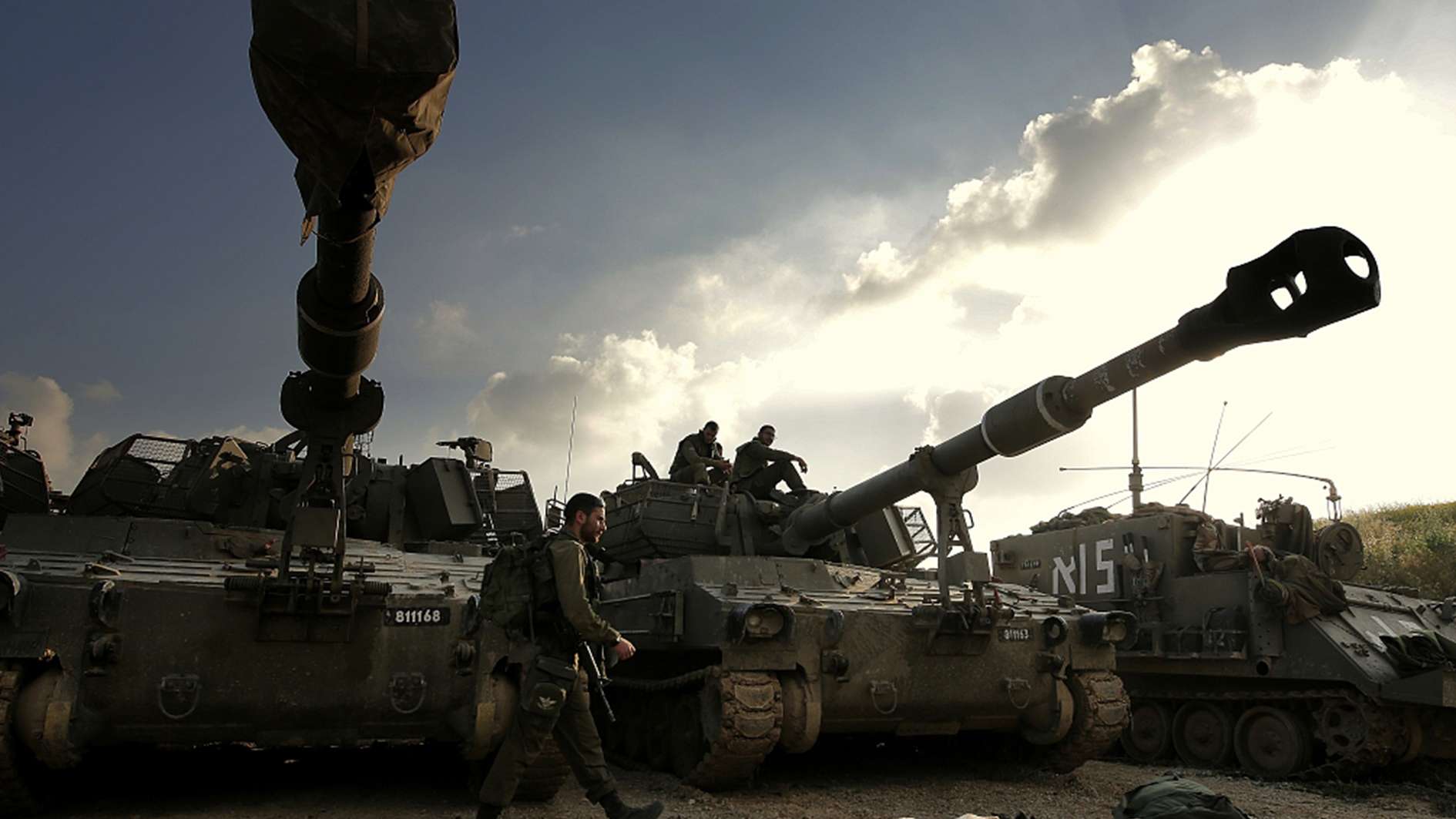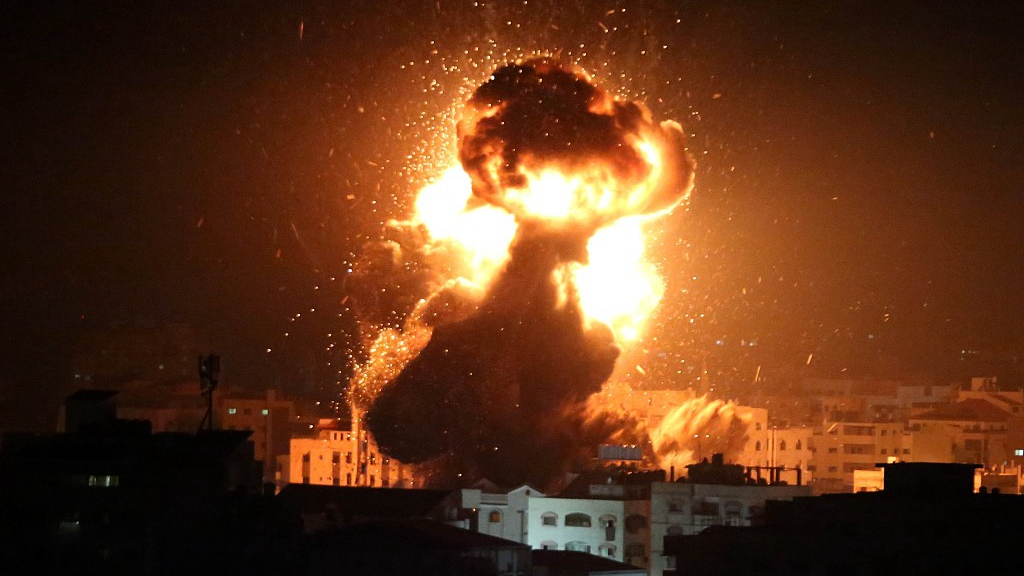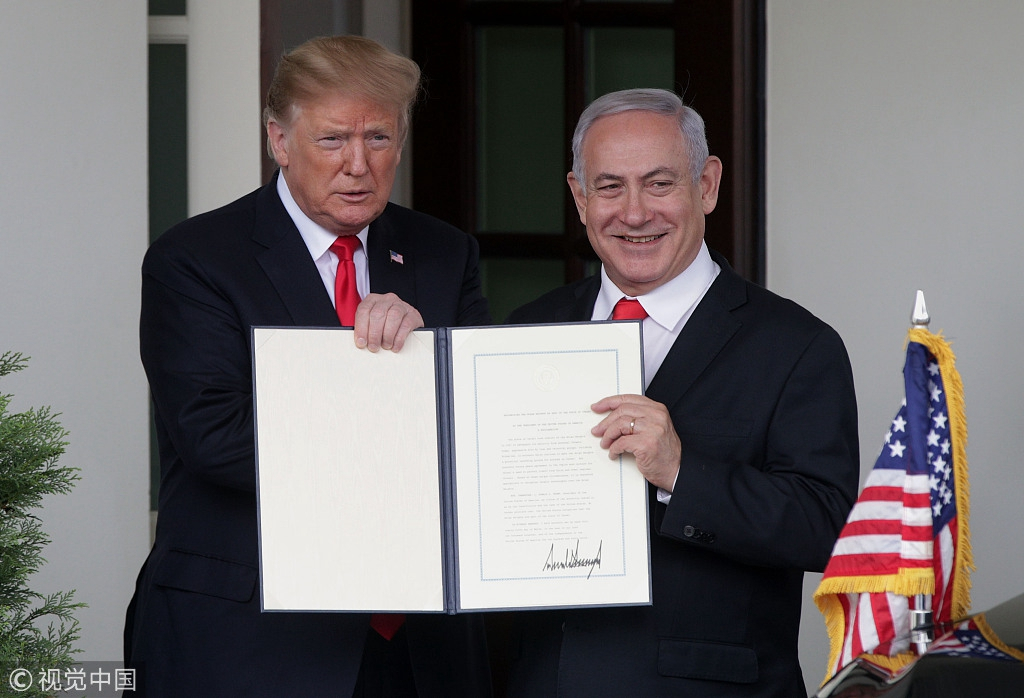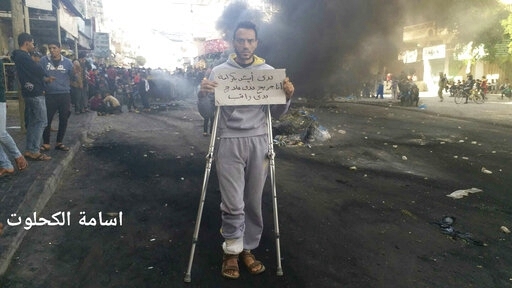00:53

The sound of explosions and air raid sirens returned this week to Israel and the Palestinian enclave Gaza. While scenes like this are not unusual in the volatile region, this time it may be different, as the leaders on both sides of the conflict have come under internal pressure.
Israelis in large parts of the coastal region spent Monday night in bomb shelters, as Hamas, the armed group that rules Gaza, fired rockets deep into Israel's territory, destroying a house near its biggest city and injuring seven civilians. It was the longest-range attack causing casualties in the country since the 2014 war.

Damaged houses are seen after a rocket hit the village of Mishmeret, north of Tel Aviv, Israel, March 25, 2019. /VCG Photo
Damaged houses are seen after a rocket hit the village of Mishmeret, north of Tel Aviv, Israel, March 25, 2019. /VCG Photo
In retaliation, Israel pounded military targets in Gaza including the office of Hamas leader Ismail Haniyeh, who had evacuated the building. The Gaza health ministry said seven Palestinians were wounded by the air strikes.
A tense calm appeared to have taken hold after reports of an Egyptian-brokered truce and more cross-border exchange of fire.
Israeli Prime Minister Benjamin Netanyahu, who cut short a visit to the United States on Monday to handle the crisis, threatened with a forceful response and further military action in Gaza. He told the U.S. pro-Israel lobby in a video address that he was "prepared to do a lot more" when it comes to defending Israel.

Smoke and flames rise from Hamas leader Ismail Haniyeh's office in western Gaza after Israeli warplanes carry out a fresh wave of airstrikes, March 25, 2019. / VCG Photo
Smoke and flames rise from Hamas leader Ismail Haniyeh's office in western Gaza after Israeli warplanes carry out a fresh wave of airstrikes, March 25, 2019. / VCG Photo
Tough-on-security PM challenged
The latest escalation came just two weeks before a closely contested Israeli election. After a decade in power, Netanyahu is now facing strong challenge from a centrist coalition led by former army chief Benny Gantz.
Monday's violence has put a dent on Netanyahu's tough-on-security image as the prime minister's opponents accused him of showing signs of weakness.
Besides his hardline stance on security, Netanyahu is well known for his close ties with Washington. In a major boost for the Likud leader's campaign, U.S. President Donald Trump on Monday formally recognized Israel's 1981 annexation of the Golan Heights, which Israel took from Syria in the 1967 Middle East War.
The decision, like last year's recognition of Jerusalem as Israel's capital by the Trump administration, followed by the relocation of the U.S. embassy there, drew
international criticism but was seen as strengthening the Israeli leader's standing at home.

U.S. President Donald Trump and Israel's Prime Minister Benjamin Netanyahu hold up a proclamation recognizing Israel's sovereignty over Syria's Golan Heights at the White House in Washington D.C., March 25, 2019. /VCG Photo
U.S. President Donald Trump and Israel's Prime Minister Benjamin Netanyahu hold up a proclamation recognizing Israel's sovereignty over Syria's Golan Heights at the White House in Washington D.C., March 25, 2019. /VCG Photo
Meanwhile, Netanyahu's chief election rival Gantz has presented himself as a better alternative for Israel in Washington. Mixing hawkish positions on security issues with a call for unity in his speech, the army general won over an audience at the pro-Israel group American Israel Public Affairs Committee (AIPAC)'s annual gathering on Monday.
Gantz's military background, in particular, has proved a hit with the right-leaning AIPAC crowd, many of whom hold the Israeli army in high regards and have been staunch supporters of Netanyahu.
However, AIPAC and other pro-Israel groups in the U.S. have criticized Netanyahu's pre-election dealings with far-right parties, which call for the expulsion of Palestinians and Israeli Arabs. Gantz's message of unity appealed to his country's U.S. supporters.
Netanyahu's election prospects have also been clouded by recent corruption scandals.
He has denied any wrongdoing.
Protests in Gaza not only against Israel
Palestinians in Gaza have been holding weekly protests at the border against the Israeli blockade, which is blamed for the dire humanitarian situation inside the enclave. But over the past weeks, Gazans have turned some of their frustration toward their militant rulers Hamas.
Under the slogan "We want to live," Palestinians across Gaza have taken to the street to protest against the high cost of living and taxes on basic goods imposed by Hamas authorities.
The protests were met with a violent crackdown with protesters, journalists and activists reportedly beaten up by Hamas militants, rights groups said. Among them, a spokesperson for Fatah, the party that dominates the Palestinian Authority (PA) in the West Bank, was attacked last Monday by a group of masked and armed men in the Gaza Strip, according to a statement from Palestinian human rights organization Al Mezan Center.
Nickolay Mladenov, the United Nations envoy to Israel and the Palestinian territories, criticized the crackdown on Twitter: "I condemn the Hamas violence in Gaza against protesters, women, children, journalists and human rights activists."

Photo provided by Palestinian journalist Osama al-Kahlout shows a protester holding a sign that reads in Arabic, "I want to live in dignity; I'm wounded and need treatment and a salary," during a protest in Gaza, March 15, 2019. /AP Photo
Photo provided by Palestinian journalist Osama al-Kahlout shows a protester holding a sign that reads in Arabic, "I want to live in dignity; I'm wounded and need treatment and a salary," during a protest in Gaza, March 15, 2019. /AP Photo
Hamas has dismissed the internal protests as a scheme by the PA to create "chaos and insecurity in Gaza." In a statement published on its official website, the group claimed the protests aimed at "promoting rift among the Palestinian factions and fragmenting their unity."
Hamas took over Gaza in 2007 after it ousted the Fatah-dominated PA from the territory. With youth unemployment at around 70 percent, Gaza's economy is in a state of collapse, according to the World Bank. This is mainly due to a decade-long security blockade by Israel and Egypt limiting the movement of people and goods.
This week's rocket attacks came amid heightened tensions on the Israel-Gaza border ahead of the March 30 anniversary of Gaza protests, which saw Palestinian protesters attempting to breach the border and Israeli soldiers opening fire at protesters. These ongoing protests have led to some 200 deaths.
The two sides fought three bloody wars and have since come close to an all-out confrontation on multiple occasions, the most recent being a major escalation in November last year.
Facing off again with their biggest enemy, Israel, the Palestinian leadership's internal problems are conveniently muted.
In a rare move this week, Israel's military deployed extra troops to the border. And now with Israel's controversial claim of the Golan Heights in the spotlight, and premiership candidates campaigning on hawkish rhetorics, more uncertainties in the region are likely on the horizon.
(Top image: Israeli soldiers are seen next to two self-propelled guns and an armored command vehicle near the border with Gaza, in southern Israel, March 27, 2019. /VCG Photo)






